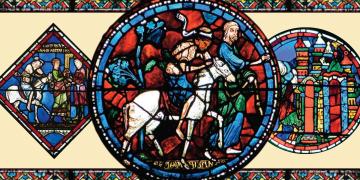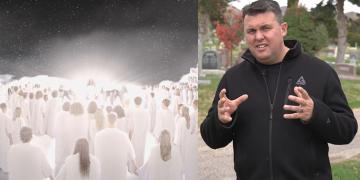You are here
Book of Mormon Central is in the process of migrating to our new Scripture Central website.
We ask for your patience during this transition. Over the coming weeks, all pages of bookofmormoncentral.org will be redirected to their corresponding page on scripturecentral.org, resulting in minimal disruption.
Every week, Latter-day Saints gather in congregations across the world and partake of the sacrament. This act hearkens back to the Savior’s Last Supper, when He commanded His disciples to eat bread and drink wine—symbols of His body and blood—in “remembrance” of Him (Luke 22:19–20).1 In the sacrament prayers recorded in restoration scripture, we are likewise commanded to “always remember” the Savior (D&C 20:77, 79).
Clearly, one of the central purposes of the sacrament is to help followers of Christ remember His sacrifice. But have you ever stopped to think about what it actually means to “remember”? Is it merely to recall who Jesus is and recount the narratives about His Atonement found in scripture? Or does it mean something more?
The sacrament prayers come from the Book of Mormon (Moroni 4:3; 5:2) and were directly inspired by the Savior’s own words to the Nephites when He instituted this ordinance among them (3 Nephi 18:7–11). That being the case, we can better understand how we are supposed to “remember” Christ by looking at how Book of Mormon prophets used the word “remember.”
According to Louis Midgley, “The Book of Mormon uses terms related to remembering and forgetting well over two hundred times.”2 Midgley made several observations about “remembrance” in the Book of Mormon:
- Remembrance refers to action. King Benjamin taught his sons about how their forefathers suffered afflictions in the wilderness “to stir them up in remembrance of their duty” (Mosiah 1:17).
- The call to remember is often a passionate plea to see God’s hand in delivering His people from bondage and captivity (Alma 29:10–12). Formal acts of remembrance—such as the performance of ordinances or ritual actions—allow us to feel like we are actually participating in the past events of God’s deliverance.
- Remembrance includes active participation in some form; it means turning one’s heart toward God, that is, repenting.
- To remember God leads to prospering and being lifted up at the last day (3 Nephi 15:1; Alma 38:5). In contrast, forgetting God leads to perishing and being cut off from Him (Alma 37:13; 42:11). Those who forget are in a dreadful sleep (2 Nephi 1:12–13); they suffer from spiritual blindness and disbelief (3 Nephi 2:1–2).
- To remember is also to keep the commandments (Helaman 5:14). In fact, to remember and to keep are sometimes used interchangeably in both the Old Testament and the Book of Mormon (Deuteronomy 5:12; Exodus 20:8; Jarom 1:5; Mosiah 18:23).
- Remembering, in the Book of Mormon, is to keep the terms of the covenant between God and His people (1 Nephi 2:24; Alma 37:13; Mosiah 1:5–7).3
The main thrust of all these points is that to remember is not merely to recall or think about some past event. It means to do something. It’s much like when a parent asks a child if he or she has remembered to accomplish a chore, such as taking out the trash. The parent isn’t just asking if the child has intellectually recalled that task; rather, the parent wants to know if the child has done it!
In the Book of Mormon, Midgley stressed, remembering and action create an upward spiral of obedience to God (Mosiah 13:29–30). “From the perspective of the Book of Mormon, one does not act only in order to remember. The two ideas are connected in both directions: a person remembers in the deepest sense only by acting in conformity with the will of God, and the action then stirs remembrance,” and on and on goes the cycle.4 One compelling illustration of this upward spiral is toward the end of Alma, where chiasmus is used to show how remembering the Lord leads to increasingly greater prosperity (see Alma 62:48–51).
Much of this relates to our partaking of the sacrament—which is meant to remind us of our covenants made at Baptism and to help us recommit to keeping the commandments. To “always remember” Christ, therefore, means to not just to recall who He is. It means to always follow Him, to do the things He would have us do in all circumstances, and to live according His principles. Doing these things, in turn, should further remind us of Him and help us constantly follow Him, creating an upward cycle that brings us ever closer to Him and to our Father in Heaven.
This week, as you partake of the sacrament, seek to truly remember the Savior, and commit to doing so throughout the week and “always.”
- 1. See also, Matthew 26:26–27; Mark 14:22–23; 1 Corinthians 11:24–25.
- 2. Louis Midgley, “The Ways of Remembrance,” in Rediscovering the Book of Mormon: Insights You May Have Missed Before, ed. John L. Sorenson and Melvin J. Thorne (Salt Lake City and Provo, UT: Deseret Book and FARMS, 1991), 168. See also, Louis Midgley, “To Remember and Keep: On the Book of Mormon as an Ancient Book,” in The Disciple as Scholar: Essays on Scripture and the Ancient World in Honor of Richard Lloyd Anderson, ed. Stephen D. Ricks, Donald W. Parry, and Andrew H. Hedges (Provo, UT: FARMS, 2000), 95–137; Louis Midgley, “‘O Man, Remember, and Perish Not’ (Mosiah 4:30),” in Reexploring the Book of Mormon: A Decade of New Research, ed. John W. Welch (Salt Lake City and Provo, UT: Deseret Book and FARMS, 1992), 127–129.
- 3. These points paraphrase the substance of Midgley, “Ways of Remembrance,” 168–176.
- 4. Midgley, “Ways of Remembrance,” 172.
Subscribe
Get the latest updates on Book of Mormon topics and research for free








